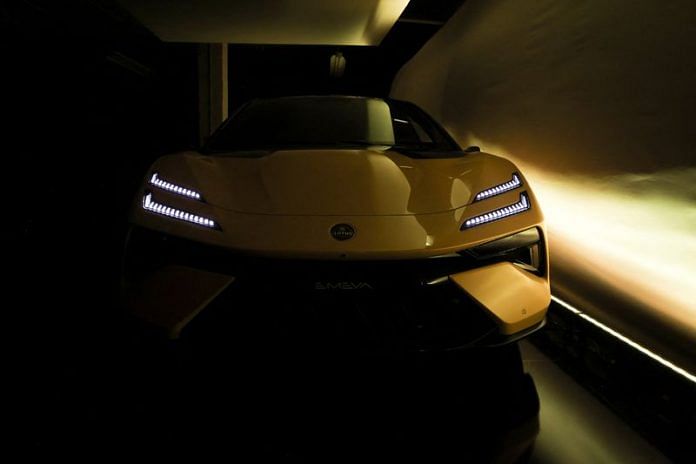By Nick Carey
(Reuters) – Lotus unveiled a fully-electric grand tourer (GT) sports car in New York on Thursday, the latest step in the British-based carmaker’s plans to go from a niche storied brand to a mass manufacturer with sales of 150,000 cars a year by 2028.
The Emeya will start production in 2024 at a factory in Wuhan, China run by Chinese automaker Geely, which jointly owns Lotus with Malaysia’s Etika Automotive.
The GT should have a range of just under 400 miles and have a price roughly comparable to Lotus’ Eletre SUV model, which started production this year and ranges in price from 90,000 pounds ($112,300) to 130,000 pounds, Chief Commercial Officer Mike Johnstone told Reuters.
A GT has luxury features to make it more comfortable for long-distance driving.
The Emeya has a top speed of 155 miles (250 km) per hour. With fast-charging capability it can add 93 miles of range in five minutes.
Johnstone said with Emeya, Lotus is targeting people “looking for something different in an electrified GT-style sports car.”
“We expect, as we’ve already seen with Eletre, to see a number of people come over from German brands,” Johnstone added. “We’re already seeing people come over from Tesla as well.”
Since its founding in 1948, Lotus typically made 5,000 cars a year, but funded by Geely and Etika, the company has planned a massive expansion.
Lotus Technology, which includes Lotus Cars, is also due to go public this year via a merger with special purpose acquisition company L Catterton Asia Acquisition Corp.
Johnstone said that public listing remains on track.
Geely has a sprawling carmaking empire and has listed parts of Volvo Cars, including Polestar. Its premium Chinese luxury brand Zeekr is talking to investors about a possible initial public offering.
Geely also plans to turn the London Electric Vehicle Company, which makes iconic black taxis, into a high-volume, all-electric brand.
($1 = 0.8014 pounds)
(Reporting By Nick Carey; Editing by Susan Fenton)
Disclaimer: This report is auto generated from the Reuters news service. ThePrint holds no responsibilty for its content.





